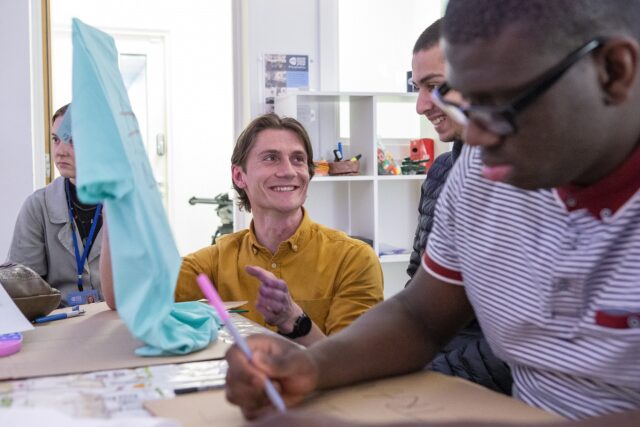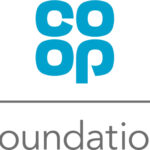Our theory of change
Our 2022-27 theory of change sets out the impact we want to achieve over the next five years, and the pathway to change for the individuals and partners we support. It focuses on giving more power to people and organisations. We’ll do this because we believe we can only build the fairer and more co-operative communities young people want to see by:
- Sharing our power
- Being flexible, and
- Developing trusting relationships.

Words by Dr Asimina Vergou, Andy Mortimer and Sarah Barton
At the Co-op Foundation, we’re committed to continually improving what we do so we can support the organisations and individuals we fund to have a greater impact in their communities.
This all aligns to our five-year ‘Building communities of the future together’ strategy and 10-year youth-led vision, which we launched in 2022. We awarded the first grants from this strategy in June 2023, and you can read all about who we funded and why.
As part of implementing our strategy, we developed a theory of change (2022-27). We created it with young people, funded partners, colleagues, trustees and the Co-op using a participatory process. Our theory of change will help us focus our activities over the lifetime of our strategy so we can reflect, learn from and improve our work.
Read our theory of change to find out how we’ll build communities of the future together and deliver on Co-op’s vision of ‘Co-operating for a Fairer World’. You can also download it as a PDF or plain text Word doc.
What is a theory of change and how will we use it?
A theory of change is an assumption about the relationship between the changes we want to see and the actions that may bring about those changes. Put differently: “If I do ‘x’, then I expect ‘y’ to occur for these reasons”i.
Experts have cautioned that theories of change can often be ‘superficial’ and mechanistic and do not explore deeper questions on assumptions. Instead, theories of change should be considered as a flexible ‘rough guide’ that offers a unique set of perspectives, not a definitive, static prediction. A good theory of change should, therefore, be revised and adapted in the light of experience, evaluation feedback and evidenceii.
We accept that our own theory of change will evolve over time as we learn more about how to put our funding approaches into practice, how we progress in creating our future communities and our contribution to these changes. We will review and refine our theory of change as we assess if our activities are bringing about change and if the pathways to change are accurate and realistic.
We will also use our theory of change to guide strategic choices, and as a basis for articulating what we want to achieve when we design our future funds. Our theory of change will be our compass for focusing our activities and ensuring we remain aligned with our strategy, rather than getting distracted when different funding opportunities arise.
A snapshot of our theory of change
Over the next five years of implementing our strategy, we will work towards the following impact:
Young people and organisations have more power to build fairer and more co-operative communities.
We worked to a five-year timeline for two reasons:
- It matched the five year timespan of our strategy
- It was the midpoint of our 10-year vision so we could measure impact – and learn – halfway through.
To achieve our impact, we identified a range of activities we’ll do as a Foundation as well as long, medium and short-term outcomes for the two primary groups we’ll work with over these five years – young people and our funded partners.
You can see the theory of change diagrams we’ve created for young people and funded partners or view our complete theory of change in brief.
You can also read all about the challenges, opportunities and assumptions we’ve made in our full theory of change PDF
How we made it
We worked closely with the National Council for Voluntary Organisations (NCVO) to develop our theory of change. Being true to our co-operative values, we involved the Co-op Foundation team as well as trustees, Co-op colleagues, funded partners and young people through an iterative process that included:
- Consultation (December 2022 to January 2023): We consulted 22 individuals through interviews and small group sessions. We gathered perspectives from our team and closest stakeholders about the long-term impact we would like to have. We also discussed the different contexts and factors influencing our work and listened to our stakeholders’ perspectives on what we do and should be doing, with whom and why.
- Review and refinement (January to February 2023): NCVO created a straw theory of change, which was revised in two workshops with the Foundation team and the trustees.
- Finalising and narrative writing (March 2023): We narrowed down the outcomes and activities, created a visual representation and co-authored a narrative with NCVO. Writing the narrative was important to explain in more detail the logic behind our theory of change, why it matters to us, the context we operate and our assumptions. We also found that writing the narrative made us reflect on the outcomes and causal links we included in the visual, and identify elements that were missing.
- Disseminating our theory of change (June-July 2023): We are sharing our theory of change with our internal and external stakeholders through dedicated online sessions, blogs and articles in third-sector. This step is critical for using our theory of change and inspiring others to adopt a similar approach.
What’s next?
Bringing to life our Future Communities Vision can only be done through co-operation. For us, this means co-operating with others from across the Co-op as well as the wider co-operative movement and social change and philanthropy sectors. We hope that sharing our theory of change with you all will make it easier for other funders and charities to see how their work fits with ours.
We will also use our theory of change to help develop an evaluation framework to track change against the outcomes we identified. We will continue our co-creation approach with this piece of work and involve some stakeholders in this process. It is not possible to spend time measuring everything that changes. That’s why we’ll prioritise outcomes for measurement, decide indicators of success and design methods to collect our data. We will use our theory of change and evaluation framework to structure and share our future impact reports.
Sign up below to receive our blogs and news on our next steps in measuring change against the delivery of our strategy. You can also contact Asimina Vergou, Head of Impact & Learning, if you are designing your map of change and would like to find out more about our approach.
Footnotes
i Connolly, M. R., and Seymour, E. (2015). Why theories of change matter (No. WCER Working Paper No. 2015-2).
ii Valters, C. (2015). Theories of Change. Time for a radical approach to learning in development. London: Overseas Development Institute.
